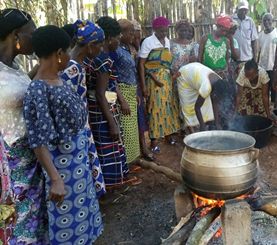Forest producer organizations More than 1.5 billion smallholders throughout the world depend on forest and farm landscapes to produce food, fuel, timber and non-wood forest products (NWFPs) to meet their subsistence needs and generate cash income. Advancing the recognition of smallholders, local communities and indigenous peoples’ land and resource rights is important for governments to meet various international commitments. Although 76% of the world’s forested area are under direct state control, much of it is managed under community and customary systems. Many of these smallholders and community groups are mobilized to work collectively in different types of producer organizations.  ©Marvin Camposeco, Momostenango, GuatemalaProducer organizations are formal or informal associations that use forests, lands and natural resources; build enterprises and value chains for forest products; and increase income and well-being while reducing poverty. If provided with adequate policy support, as well as access to finance and technical capacity, forest producer organizations can constitute efficient vehicles to achieve ambitious goals at landscape levels for building rural prosperity while also meeting environmental sustainability goals. ©Marvin Camposeco, Momostenango, GuatemalaProducer organizations are formal or informal associations that use forests, lands and natural resources; build enterprises and value chains for forest products; and increase income and well-being while reducing poverty. If provided with adequate policy support, as well as access to finance and technical capacity, forest producer organizations can constitute efficient vehicles to achieve ambitious goals at landscape levels for building rural prosperity while also meeting environmental sustainability goals.
FAO Forestry’s work on producer organizations promotes the development of policies and strengthens the capacity of organizations to improve their governance, gender equality, market access and sustainability. FAO’s main activities on forest producer organizations include:  @FAO/Issifou Aboudoumisamilou, Tove Ati, Togo @FAO/Issifou Aboudoumisamilou, Tove Ati, Togo
- Support forestry's contributions to reducing rural poverty in ways which are sustainable by promoting policy and capacity development in countries for more effective organizations of small-scale forest producers.
- Develop normative products that respond to country capacity needs including thematic capacity building materials for forest producer organizations (FPOs) as well as communications products to enhance understanding and knowledge about FPOs.
- Provide technical advice to FPOs on issues of forest tenure, community-based forest management, small-scale forest enterprise development and forests' contributions to food security and nutrition, for enhancing the extent and effectiveness of smallholder and community-based forestry.
- Coordinate with the Forest and Farm Facility, other forestry projects, decentralized offices and relevant divisions in FAO on issues related to poverty reduction, smallholder empowerment, rural institutions, cooperatives, producer organizations and small enterprise development
- Facilitate and promote partnerships and collaborative activities to leverage resources, finance and opportunities for FPOs to improve livelihoods, access services and markets and engage in policy discussions.
| 

